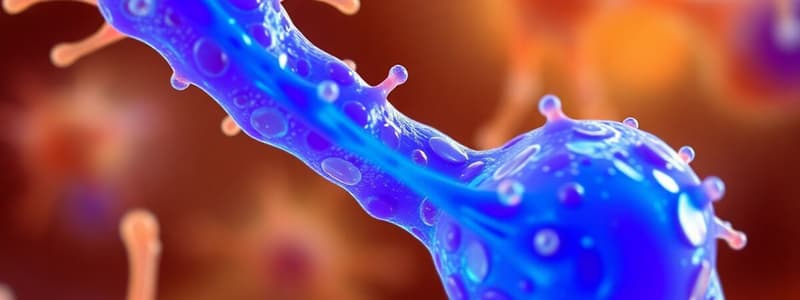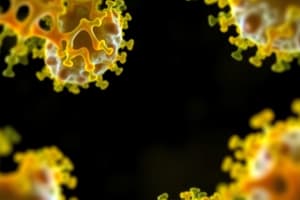Podcast
Questions and Answers
What is the primary purpose of meiosis in organisms?
What is the primary purpose of meiosis in organisms?
- To generate haploid gametes for sexual reproduction (correct)
- To produce genetically identical cells for growth
- To create diploid cells for repair
- To facilitate asexual reproduction
Which factor is NOT involved in the regulation of gene expression?
Which factor is NOT involved in the regulation of gene expression?
- Cell division (correct)
- Transcription factors
- Environmental stimuli
- Epigenetic modifications
How does mitosis differ from meiosis?
How does mitosis differ from meiosis?
- Mitosis is for sexual reproduction; meiosis is for asexual reproduction
- Mitosis results in four gametes; meiosis results in two cells
- Mitosis only occurs in unicellular organisms; meiosis occurs in multicellular organisms
- Mitosis produces identical daughter cells; meiosis produces genetic variation (correct)
What does the study of population genetics focus on?
What does the study of population genetics focus on?
Which of the following statements about gene expression is true?
Which of the following statements about gene expression is true?
Which of the following organelles is responsible for energy production in eukaryotic cells?
Which of the following organelles is responsible for energy production in eukaryotic cells?
What structural feature distinguishes prokaryotic cells from eukaryotic cells?
What structural feature distinguishes prokaryotic cells from eukaryotic cells?
In cellular respiration, which of the following processes generates the most ATP?
In cellular respiration, which of the following processes generates the most ATP?
What is a critical function of the cytoskeleton in eukaryotic cells?
What is a critical function of the cytoskeleton in eukaryotic cells?
Which type of signaling involves long-distance communication between cells?
Which type of signaling involves long-distance communication between cells?
In the process of photosynthesis, where do the light-dependent reactions occur?
In the process of photosynthesis, where do the light-dependent reactions occur?
Which component of prokaryotic cells provides protection and structure?
Which component of prokaryotic cells provides protection and structure?
What is the primary function of the Golgi apparatus in eukaryotic cells?
What is the primary function of the Golgi apparatus in eukaryotic cells?
Flashcards
What is mitosis?
What is mitosis?
The process by which a single parent cell divides into two identical daughter cells. This is essential for growth, repair, and asexual reproduction.
What is meiosis?
What is meiosis?
A specialized cell division process where one diploid cell divides into four haploid gametes. It plays a crucial role in sexual reproduction.
What is gene expression?
What is gene expression?
The process by which genetic information encoded in a gene is used to create a protein.
What is gene regulation?
What is gene regulation?
Signup and view all the flashcards
What is population genetics?
What is population genetics?
Signup and view all the flashcards
What's the difference between prokaryotic and eukaryotic cells?
What's the difference between prokaryotic and eukaryotic cells?
Signup and view all the flashcards
Cytoskeleton
Cytoskeleton
Signup and view all the flashcards
Cell signaling
Cell signaling
Signup and view all the flashcards
Cellular respiration
Cellular respiration
Signup and view all the flashcards
Photosynthesis
Photosynthesis
Signup and view all the flashcards
Endoplasmic reticulum
Endoplasmic reticulum
Signup and view all the flashcards
Golgi apparatus
Golgi apparatus
Signup and view all the flashcards
Lysosomes
Lysosomes
Signup and view all the flashcards
Study Notes
Module 2: Key Concepts
- OCR A-Level Biology Module 2 covers eukaryotes and prokaryotes, cell signaling, and genetics across organisms.
- The module emphasizes how biological processes are interconnected and adapt to environments.
- Gene expression control, mitosis, meiosis, and genetics are key cellular-level topics.
- Organisms' interactions with their environment is repeatedly examined through examples and case studies.
Eukaryotic Cell Structure
- Eukaryotic cells have membrane-bound organelles (nucleus, mitochondria, endoplasmic reticulum, Golgi apparatus, lysosomes, vacuoles).
- Each organelle has a specific role in cellular functions (energy production, protein synthesis, waste disposal).
- The cytoskeleton shapes the cell and enables internal transport.
Prokaryotic Cell Structure
- Prokaryotic cells are simpler, lacking membrane-bound organelles.
- Key features include a cell wall (often peptidoglycan), capsule (protective outer layer), plasma membrane, ribosomes, and a single circular chromosome.
Cell Signaling
- Cell signaling enables communication between cells for coordinated responses to internal and external triggers.
- Signaling pathways are cascades, starting with a signal molecule and resulting in a cellular response.
- Signaling pathways are various depending on the distance the signal travels (paracrine, endocrine, etc.).
Cellular Respiration
- Cellular respiration breaks down organic molecules to produce ATP (energy).
- Glycolysis, Krebs cycle, and electron transport chain form this process.
- Anaerobic and aerobic respiration yields different ATP amounts.
Photosynthesis
- Photosynthetic organisms use light to turn carbon dioxide and water into glucose and oxygen.
- Photosynthesis takes place in chloroplasts, with light-dependent and light-independent reactions.
Mitosis and Meiosis
- Mitosis produces genetically identical daughter cells from a parent cell, essential for growth, repair, and asexual reproduction.
- Meiosis forms four haploid gametes from a single diploid cell, vital for sexual reproduction.
Gene Expression and Regulation
- Gene expression uses gene information to create proteins.
- Gene expression regulation controls when and how genes are expressed (critical for development, differentiation, and environmental responses).
- Transcription factors and epigenetic modifications affect gene expression.
Genetics in Relation to Organisms
- Mendelian genetics, inheritance patterns, and probability are studied.
- Population genetics examines genetic variation within populations.
- Molecular genetics explores DNA replication, transcription, and translation.
Case Studies
- Case studies demonstrate biological concepts and practical applications across organisms and their environmental interactions.
Studying That Suits You
Use AI to generate personalized quizzes and flashcards to suit your learning preferences.




